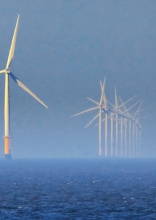
To help achieve the EU objective of climate neutrality by 2050, the European Commission today presented the European strategy for offshore renewable energy. The strategy proposes to increase European offshore wind capacity from the current level of 12 GW to at least 60 GW by 2030 and to 300 GW by 2050. The Commission intends to complement this with 40 GW of energy from the oceans and other emerging technologies such as floating wind and solar power by 2050.
This ambitious growth will build on the huge energy potential in all European sea basins and the global leadership position of EU companies in the sector. The strategy should create new opportunities for industry with green jobs across the continent and strengthen the EU's global leadership in offshore energy technologies. It should also ensure the protection of our environment, biodiversity and fisheries.
To promote the scaling up of offshore energy capacity, the Commission will encourage cross-border cooperation between Member States on long-term planning and deployment. To this end, offshore renewable energy development targets should be integrated into national marine spatial plans to be submitted by coastal states to the Commission by March 2021. The Commission will also propose, in the framework of the revised TEN-E Regulation, a framework for the long-term planning of offshore networks, involving regulators and Member States in each sea basin.
The Commission estimates that the implementation of this plan will require investments of nearly €800 billion between now and 2050. To help generate and implement this investment, the Commission will:
In order to analyze and monitor the environmental, social and economic impacts of offshore renewable energy on the marine environment and the economic activities that depend on it, the Commission will consult a community of government experts, stakeholders and scientists on a regular basis. Within this context, the Commission also adopted today a new guidance document on the development of wind energy and EU nature legislation.
The strategy including accompanying documents can be consulted here.